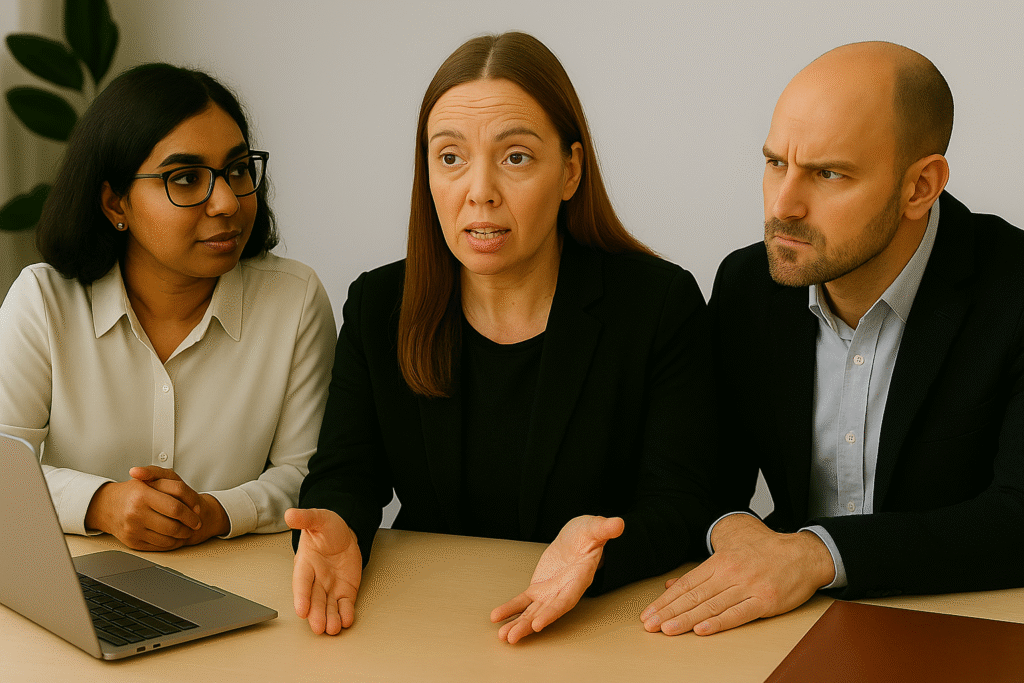Case 3.2, Question 2: From a skills perspective, how would you describe the three managers, Kelly, Danielle, and Patrick? What does each of them need to do to improve their skills?
The skills approach in the chapter are defined through the studies of Katz (1995), and were emphasized by the studies of Mumford et al. (2000). There are three categories: technical, human, and conceptual. To better understand the categories before analyzing the managers, in Northhouse (2022), the definition of technical: “Technical skills are knowledge about and proficiency in a specific type of work or activity. They include competencies in a specialized area, analytical ability, and the ability to use appropriate tools and techniques (Katz, 1955).” Good examples would be knowing how to use formulas in Excel to do the company’s accounting correctly or prepare food without waste, tasty and with quality. In Northhouse (2022), the definition of human skills: “Human skills are knowledge about and ability to work with people.” This involves being pleasant, friendly, treating people well, having good communication. And finally, Conceptual Skills are “the ability to work with ideas and concepts” (Northouse, 2022). This is something that involves the future of the company, as it outlines a strategic plan, what the company’s vision is, and what path the company should follow.
Taking these skills into consideration, let’s analyze the managers.
Kelly: responsible for the kitchen, excellent in the technical part, able to manage the team and deliver efficiency. However, there is friction between her and other sectors of the company. She is the type of employee who stays in the “box”, unable to have a vision of the company as a whole, it seems that she only focuses on her sector. She has to improve communication and treat salespeople, delivery people and waitstaff better, as they are also important parts of the team who need to feel valued. She has to be more empathetic and understand the importance of collaboration.
Danielle: Unlike Kelly, Danielle is very good at human skills, she gets along very well with customers, and she is aligned with Andy’s vision. However, she is bad at the analytical part, technical training is necessary for this manager. Andy has to try to understand the situation, is the system difficult for her, very outdated? Can the restaurant implement a system that is easier to operate? Danielle would be interested in taking some classes on finance, cash flow, inventory, and accounting-related topics so she can do her job and deliver reliable data.
Patrick: Very good at the technical side, but like Kelly, he has difficulty with human skills. He can’t connect with customers and doesn’t show emotions. He also can’t see a middle ground or combine some skills to solve problems; in his mind, it’s one way or the other. He needs to develop this more conceptual vision and learn to filter what is most important at the moment. I believe that, like Kelly, he needs to understand the importance of this more fluid personal relationship and, in addition, be able to visualize the consequences of his actions now in the future.
A study from the Philippines (Campos and Campos, 2023) in the food sector showed that technical, human, and interpersonal skills affect human capital: “To improve human capital in the food processing industry, it is important to prioritize capacity building, adopt strategies that enhance employee performance, and advance food processing technologies.” In addition to training, the company must update itself to offer more modern technologies to be able to optimize work. The study also shows the importance of communication within the work environment.
Case 3.3, Question 1: Applying the Katz three-skills approach, describe Peter Tabichi’s technical, human, and conceptual skills. Which of these three skills is most important to Tabichi’s success as a leader?
This is a great case of resilience, because it was a case that had everything to go very wrong, a place marked by poverty, hunger, misery, ethnic conflicts, and no structure. But the teacher managed to find ways for the students to achieve excellent results. Human skills were very important in Tabichi’s work, he managed to stimulate in the students a feeling of confidence, courage, and self-esteem of their abilities. He empathized with the students to understand their reality and it was a reality that he also experienced. He also used his technical and conceptual knowledge to achieve the results, he had a vision of the future and hope for the community. With his human skills he developed the students and improved the learning environment. A study from India (Panwar and Sati, 2023) showed that “human skills is the dominating factor influencing the effectiveness of school management.”
Case 3.3, Question 2: How would you describe Peter’s competencies?
Northouse (2022) defines Problem-solving skills as: “a leader’s creative ability to solve new and unusual, ill-defined organizational problems.” The teacher was proactive, encouraging the passing on of knowledge. One of the main problems faced by students is the consequences of poverty and lack of resources. He disseminated his knowledge about agriculture to teach the community ways of planting to reduce the problem of hunger, and he also took advantage of this opportunity to teach families about the importance of children continuing to study and avoiding early marriages. Yoosefi et al. (2023) shows the consequences of early marriage: “Most women who married as children were forced to drop out of school and had no chance of learning job skills, which in turn made them weak and fragile and led to other problems.”
Northouse (2022) shows that: “Social judgment skills are the ability to understand people and social systems (Zaccaro, Mumford, Connelly, Marks, & Gilbert, 2000, p. 46).” Tabichi, having lived in a similar reality to his students, understands the challenges of those communities more easily. He understands that if girls were married at an early age, this would make it difficult for them to study later. In order to be heard, he had the respect and trust of those communities.
And finally, he applied his knowledge. At Northouse, he says: “Knowledge is inextricably related to the application and implementation of problem-solving skills in organizations.” He helped solve the problem of hunger by teaching agricultural techniques. He saw the need for students to improve their math and science skills. He engaged students in mentoring and participating in clubs. He showed students that they had potential and talents. He encouraged the creation of groups for students to showcase their talents. Students participated in peace groups that helped resolve ethnic and gender conflicts. In the science club, he found ways to use his knowledge to get projects submitted to national competitions, with a success rate of 60%. The science and math club even managed to participate in international awards.
A study in Shanghai, China (Sun and Asavisanu, 2024) showed characteristics of an education leader, Professor Tabichi possibly used these skills to be successful in his journey: “educational administration competence, collaboration competence, well-being competence, time management competence, communication competence, adaptability competence, self-awareness competence, and diversity and inclusions competence.”
Case 3.3, Question 3: Describe how you believe Peter’s career experiences and environmental influences have shaped his leadership skills.
He had a difficult life; he lost his mother and a sibling when he was very young. He had the example of his father who was a teacher, despite all the difficulties, his father even took out a loan so he could go to school. Tabichi began his career in a private school, he felt he was making a difference in the lives of those students, but he felt he could help children from underprivileged communities, just like he once did. He began this journey of working in a poor rural school in the interior of Kenya. He knew he would face many challenges, but he put his leadership skills into practice to change that society.
Career experience: Northouse (2022) defines this term as: “factors that lie outside the leader’s competencies, characteristics, and experiences.” The school had only one computer, practically no resources, 1 teacher for 58 students. Tabichi had to develop creative solutions. These restrictions made him think critically to find ways to maximize student results. The success of students in national and international competitions, even with everything against them, is proof that he was able to be a leader who guided these students and showed their skills.
Environmental influences: There is no point in trying to do internal work, since the environment presents many challenges to be overcome that directly affect your results. If children are hungry, they will not learn, so we need to try to solve this problem. He demonstrated to the community that it is important for girls to be in school studying, and he showed the positive effects of this. The external affects the internal, and it is necessary to understand this in order to achieve goals. Alimuddin et al. (2023) show that “feelings of Pleasure, Student Interest, Student Attention, and Student Involvement in Learning play a very important role and have a positive influence in improving learning outcomes.”, the teacher managed to have this positive influence on the students.
Spiritual values: Tabichi used values such as humility and compassion in his leadership style, this can be seen when he decided to donate 80% of his salary to support the development of students. In addition to the academic development of students, it is about developing students as people who can help the society in which they live.
Tabichi is an empathetic and service-oriented leader. He was able to overcome challenges and difficulties so that students could deliver amazing results.
Case 2.2, Question 4: Describe some of the problem-solving skills Peter has exhibited. How have his competencies and individual attributes contributed to his problem solving?
Understanding food insecurity: Without adequate food, he realized that students would not be able to concentrate on their classes and subjects. So, he looked for ways to solve this problem. He taught agricultural techniques to the students’ families to maximize land use to ensure better nutrition. A study in Ghana by Appiah (2024) shows that adequate nutrition at school helps students achieve better results: “these meals have been associated with better cognitive function, allowing students to participate more actively in class and achieve higher academic performance.”
Promoting girls’ education: Cultural barriers could prevent girls from continuing their studies, and one of the pressures is early marriage. By understanding this reality, he was able to convince many families of the importance of educating these young women. Kuteesa et al. (2024) shows that: “By ensuring equal access to quality education for all genders, we create pathways for individuals to fulfill their potential, participate meaningfully in society, and drive positive change.” It is necessary to think about public policies to ensure girls’ right to education.
Maximizing results with very limited resources: Tabichi used his knowledge and creativity to engage students. Even though he had only one computer in a school with 500 students, he was able to use this resource to help with learning. He put his problem-solving skills into action.
He used attributes such as communication, empathy, critical thinking, and the application of knowledge in practice; these were ways to achieve leadership effectiveness.
References
Alimuddin, Rakib, M., & Rahman, N. (2023). The Influence of Learning Motivation and Family Environment on Learning Outcomes through Student Learning Activities in Social Studies Subjects at Smpn 4 Mangarabombang. Syntax Idea, 5(9), 1231–1248. https://doi-org.uncfsu.idm.oclc.org/10.46799/syntax-idea.v5i7.2416
Appiah, K. (2024). Impact of School Feeding Programs on Student Attendance and Performance in Ghana. African Journal of Education and Practice, 9(2), 23-34. https://iprjb.org/journals/index.php/AJEP/article/view/2522/2927
Campos, J. D. S., & Campos, J. R. (2023). Structural Equation Model Evaluating Katz’s Triplet Managerial Skills and Its Relationship to Human Capital. Journal of Social Entrepreneurship Theory and Practice, 2(2), 63-75. https://journals.researchsynergypress.com/index.php/jsetp/article/view/2027/1086
Kuteesa, K. N., Akpuokwe, C. U., & Udeh, C. A. (2024). Gender equity in education: addressing challenges and promoting opportunities for social empowerment. International Journal of Applied Research in Social Sciences, 6(4), 631-641. https://www.fepbl.com/index.php/ijarss/article/view/1034/1257
Northouse, Peter G. (2022). Chapter 2: Trait Approach. In Leadership: Theory and practice (9th ed., p. 27–55). SAGE.
Panwar, D., & Sati, M. C. (2023). Impact of Katz’s Skills of Managers in School Management: A Study of Pauri District in Uttarakhand, India. Migration Letters, 20(S10), 508-513. https://www.researchgate.net/profile/Divyanshu-Panwar/publication/379035672_Migration_Letters_Impact_of_Katz’s_Skills_of_Managers_in_School_Management_A_Study_of_Pauri_District_in_Uttarakhand_India/links/65f776e71f0aec67e2a2dabf/Migration-Letters-Impact-of-Katzs-Skills-of-Managers-in-School-Management-A-Study-of-Pauri-District-in-Uttarakhand-India.pdf
Sun, X., & Asavisanu, P. (2024). DEVELOPMENT OF A LEADERSHIP COMPETENCY MODEL FOR PRINCIPALS IN PRIMARY SCHOOLS IN SHANGHAI, CHINA. The EUrASEANs: journal on global socio-economic dynamics, (4 (47)), 303-315. https://euraseans.com/index.php/journal/article/view/786/704
Yoosefi Lebni, J., Solhi, M., Ebadi Fard Azar, F., Khalajabadi Farahani, F., & Irandoost, S. F. (2023). Exploring the consequences of early marriage: a conventional content analysis. INQUIRY: The Journal of Health Care Organization, Provision, and Financing, 60, 00469580231159963. https://journals.sagepub.com/doi/epub/10.1177/00469580231159963


